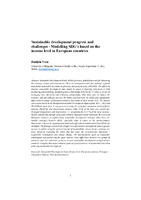Sustainable development progress and challenges - Modelling SDG’s based on the income level in European countries

View/
Metadata
Show full item record
URI
Collections
- Konferenciaközlemények [686]
Abstract
Sustainable Development Goals (SDGs) present a global framework for balancing
the economy, society and environment. These are management tools for national, regional
and global sustainable development planning and programming until 2030. The efforts to
improve sustainable development data should be aimed at fostering innovation in SDG
monitoring and modelling. Identifying inter-relationships between the 17 SDGs is crucial to
managing them effectively and achieving sustainability. This study aims to explore the
structure and interlinkages between the SDGs and determine the SDGs that significantly
differ between groups of European countries depending on their income level. The dataset
was created based on the European Sustainable Development Reports from 2017 – 2022 and
World Bank open data. It was processed using the principal component analysis/factor
analysis (PCA/FA) and discriminant analysis (DA). PCA of the data sets yielded five
Principal Components with Eigenvalues ˃1, accounting for 81,57% of the total variance.
Results indicate that specific social and economic indicators mostly determine the success of
European countries in implementing sustainable development concepts. Also, there are
notable synergies between SDGs, especially when it comes to the socio-economic
dimensions. Conversely, important potential trade-offs with environmental-related SDGs are
identified. The findings revealed that a higher level of economic development leads to greater
success in implementing the general concept of sustainability. Lower-income countries are
more advanced regarding the SDGs that fall under the environmental dimension –
responsible consumption and climate change. The discrimination goals of responsible
consumption and partnership for goals indicate clear differences between two groups of
countries and can undermine progress toward sustainable development in high-income
countries. It implies that socio-economic goals are prioritised over environmental ones when
achieving sustainable development.
- Title
- Sustainable development progress and challenges - Modelling SDG’s based on the income level in European countries
- Author
- Voza, Danijela
- xmlui.dri2xhtml.METS-1.0.item-date-issued
- 2024
- xmlui.dri2xhtml.METS-1.0.item-rights-access
- Open access
- xmlui.dri2xhtml.METS-1.0.item-other-conferenceTitle
- MEB — 22nd International Conference on Management, Enterprise, Benchmarking. Proceedings I.
- xmlui.dri2xhtml.METS-1.0.item-other-conferenceDate
- 2024
- xmlui.dri2xhtml.METS-1.0.item-language
- en
- xmlui.dri2xhtml.METS-1.0.item-format-page
- 281 p.
- xmlui.dri2xhtml.METS-1.0.item-subject-oszkar
- sustainable development goals, income level, european countries, principal component analysis, discriminant analysis
- xmlui.dri2xhtml.METS-1.0.item-description-version
- Kiadói változat
- xmlui.dri2xhtml.METS-1.0.item-other-containerTitle
- MEB — 22nd International Conference on Management, Enterprise, Benchmarking. Proceedings I. (MEB 2024)
- xmlui.dri2xhtml.METS-1.0.item-other-containerPeriodicalYear
- 2024
- xmlui.dri2xhtml.METS-1.0.item-other-containerIdentifierIsbn
- 978-963-449-361-7
- xmlui.dri2xhtml.METS-1.0.item-type-type
- Konferenciaközlemény
- xmlui.dri2xhtml.METS-1.0.item-subject-area
- Társadalomtudományok - multidiszciplináris társadalomtudományok
- xmlui.dri2xhtml.METS-1.0.item-publisher-university
- Óbudai Egyetem
- xmlui.dri2xhtml.METS-1.0.item-publisher-faculty
- Keleti Károly Gazdasági Kar
